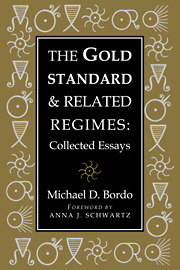Book contents
- Frontmatter
- Contents
- Foreword
- 1 The Gold Standard and Related Regimes: Introduction to the Collection
- Part I History of Doctrine and the Gold Standard
- 2 The Gold Standard: Theory
- 3 The Gold Standard: The Traditional Approach
- 4 John E. Cairnes on the Effects of the Australian Gold Discoveries, 1851–73: An Early Application of the Methodology of Positive Economics
- Part II The Gold Standard as a Commodity Standard
- Part III The Gold Standard as a Contingent Rule
- Part IV Historical Case Studies
- Part V The Bretton Woods International Monetary System
- Index
- Titles in the series
4 - John E. Cairnes on the Effects of the Australian Gold Discoveries, 1851–73: An Early Application of the Methodology of Positive Economics
Published online by Cambridge University Press: 19 October 2009
- Frontmatter
- Contents
- Foreword
- 1 The Gold Standard and Related Regimes: Introduction to the Collection
- Part I History of Doctrine and the Gold Standard
- 2 The Gold Standard: Theory
- 3 The Gold Standard: The Traditional Approach
- 4 John E. Cairnes on the Effects of the Australian Gold Discoveries, 1851–73: An Early Application of the Methodology of Positive Economics
- Part II The Gold Standard as a Commodity Standard
- Part III The Gold Standard as a Contingent Rule
- Part IV Historical Case Studies
- Part V The Bretton Woods International Monetary System
- Index
- Titles in the series
Summary
Introduction
John E. Cairnes (1823–75) is considered to be the last important economist of the British Classical tradition, a close follower of John Stuart Mill and “the most eminent of the English Economists of this period who undertook to mend the structure [of J. S. Mill].” Cairnes was most highly regarded by his contemporaries; indeed Mill expressed his admiration for him in the preface to the sixth edition of his Principles, calling him “one of the most scientific of living political economists.”
Cairnes is best remembered today for his contributions to the methodology of economic science and for the theory of noncompeting groups. In addition, his popular writings on slavery and on the effects of the Californian and Australian gold discoveries gave him an audience far wider than the ranks of political economists.
The present chapter will examine Cairnes' writings on the effects of the gold discoveries as a case study of the methodology of positive economics – that the test of a good theory lies in its ability to predict rather than the realism of its assumptions. The chapter will be based mainly on Cairnes' principal published work on the gold discoveries – his “Essays Towards a Solution of the Gold Question (1858–60).” As well, however, we will examine some of his other writings – his articles in the Economist and the Report of the British Association for the Advancement of Science, his unpublished Manuscripts on Gold, and his unpublished “Lectures on Money” given at Galway 1864/65.
- Type
- Chapter
- Information
- The Gold Standard and Related RegimesCollected Essays, pp. 125 - 146Publisher: Cambridge University PressPrint publication year: 1999



